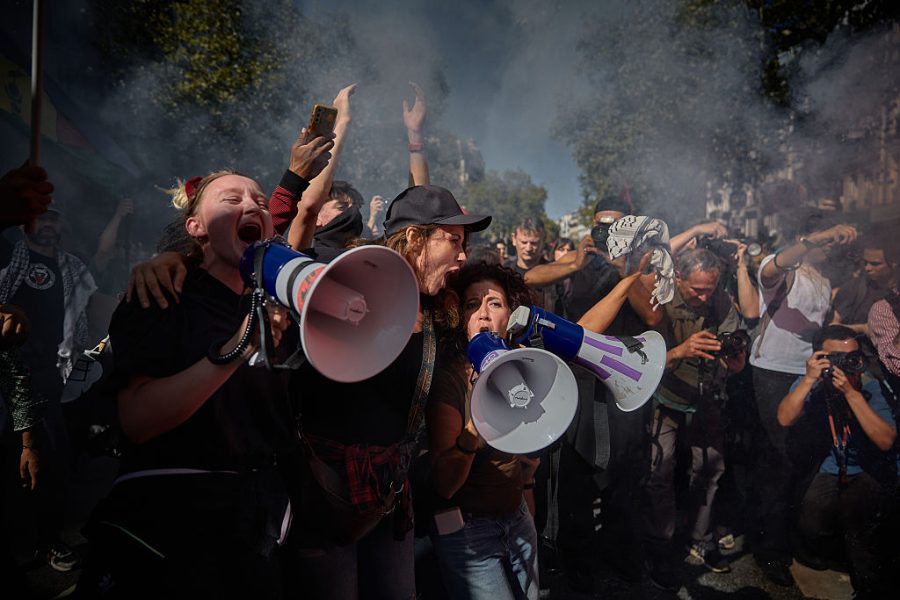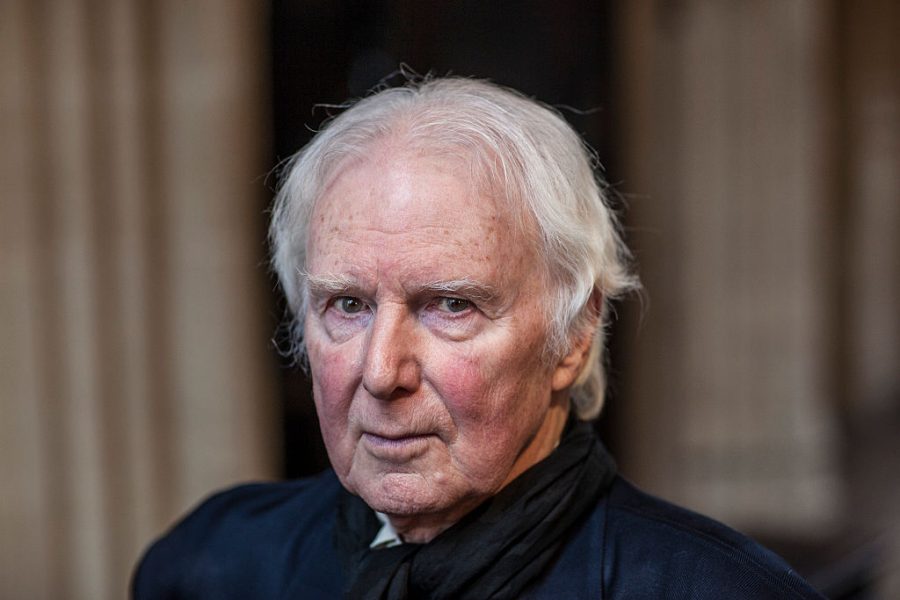One million people protested in France yesterday. That was according to the trade unions, who organised the day of industrial action. The police estimated the number of demonstrators at half a million, 309 of whom were arrested for various misdemeanours.
There were skirmishes between police and protestors in numerous cities across France, but the most significant incident was in Paris when a group of demonstrators gained entry into the Ministry of Economy and Finance. Among those protesting were nurses, pharmacists, air traffic controllers, transport workers and teachers. Next Friday it is the turn of farmers to take to the streets.
The upshot of Macron’s massive miscalculation is a very angry and troubled country
‘The anger is huge, and so is the determination,’ declared Sophie Binet, the head of the influential hard-left union CGT. ‘My message to Mr. Lecornu today is this: it’s the streets that must decide the budget.’
It is just over a week since Sébastien Lecornu was selected by Emmanuel Macron to be his fifth prime minister in two years. He has yet to announce his government and the general opinion in France is that he will be gone by Christmas. One day he is being threatened with a no-confidence vote by the left and the next by Marine Le Pen’s National Rally.
The chaos was encapsulated in an editorial in Thursday’s business-friendly Le Figaro, which concluded:
In short, a system at a standstill, incapable of establishing the conditions for fruitful social dialogue, let alone rallying the French people for the necessary effort against the mortal danger of excessive debt. How long will this agony last?
The last time France was in such a state was the late 1950s. Charles de Gaulle came to the rescue back then, rallying the country in the new Fifth Republic. Today there is no such figure. One looks at the French elite – political, cultural and academic – and one sees only mediocrity. Things are now so bad that the Italian press have taken to mocking their neighbour for its ineptitude.
France is a country run by an arrogant and out-of-touch caste that is scared of the people and determined to cling to power at all costs. As for the people, their aspirations and anxieties are diametrically opposed. The left, who made up the majority of Thursday’s protestors, want the rich to be taxed even more, the age of retirement to be lowered to 62 and an increase in public spending. The fact France is teetering towards bankruptcy seems to have passed them by.
One protestor demonstrating on Thursday told reporters: ‘We are protesters, not criminals. The criminals in this country are the white-collar workers.’
The right, be they white-collar or blue-collar workers, are fed up with working hard to prop up the lifestyles of loafers, migrants and the retired. Many are also anxious about immigration and insecurity. Earlier this month a former conservative minister, Philippe de Villiers, launched an online petition demanding a referendum on immigration; it has already amassed 1.6 million signatures.
Closely aligned to concern about mass immigration is fear about violent crime, I’ve been chronicling for a number of years the breakdown in law and order in France, but this year it feels like the country has entered a dangerous new phase. As one police union spokesman put it, ‘Fear has changed sides’. Once criminals were scared of the police but now it is the police who are fearful. With good reason. Increasingly they are being hunted and attacked by hoodlums and gangsters; in the latest incident, seven off-duty policemen enjoying a quiet drink on a terrace in Reims were set upon by a mob who recognised them as officers of the law. The footage of the ambush has shocked France. For how much longer can the Thin Blue Line hold in the face of the soaring number of thugs, gangsters and drug cartels?
To return to the question posed by Le Figaro: how long will this political and social agony last? Many believe that the only solution to the chaos is fresh elections. But would this change anything or simply return the same result: a country split into three irreconcilable blocks – left, right and a small but powerful centre?
Even in the event that Marine Le Pen’s National Rally – consistently ahead in the polls – did win an absolute majority, would the left-run institutions refuse to cooperate? And what would be the response of the extreme left to a National Rally administration?
According to a new book, The Chronicle of an Ungovernable France, Emmanuel Macron called a snap election last June because he believed the National Rally would win an absolute majority. Once in power, they would make such a mess of governance it would destroy their credibility.
That was his theory. What Macron hadn’t anticipated was an alliance between the far-left and the centre before the second round of voting – the so-called Republican Front – which kept Le Pen and her ten million voters from power.
The upshot of Macron’s massive miscalculation is a very angry and troubled country. In a recent interview, the former MP Henri Guaino, who was special advisor to Nicolas Sarkozy during his presidency, described Macron as ‘irresponsible’ in calling a snap election. ‘By playing with fire, there may come a time when there are no more deadlines, no more procedures, no more rules,’ warned Guaino. ‘That is to say, violence may end up taking over.’
That time may not be far off.








Comments